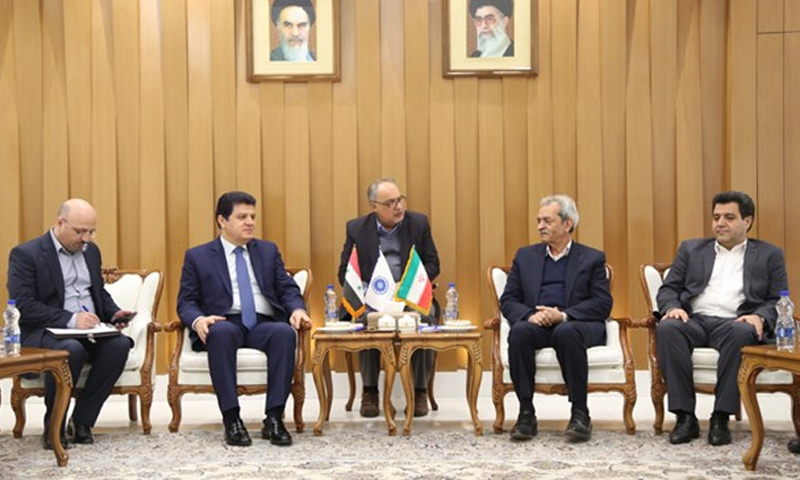A meeting in the Damascus Chamber of Commerce with an Iranian trade delegation, on Tuesday, 4 February, resulted in a set of new agreements between the governments of the Syrian regime and Iran in various fields.
During the meeting, Deputy Chairman of the “Syrian Iranian Joint Chamber of Commerce, Fahad Darwish, revealed the completion of the establishment of the Iranian center in the Damascus free zone and announced further two new centers to be established.
Darwish said that the Iranian trade center in Damascus free zone is ready to receive Iranian goods and distribute them in Syria and the neighboring countries and that the center is likely to start operating within three months.
The Deputy Chairman of the “Syrian-Iranian Joint Chamber of Commerce” also announced the establishment of two joint free zones between Syria and Iran in the town of Hasya in the province of Homs countryside and the province of Latakia, according to al-Watan, a pro-government newspaper.
The Syrian Iranian bank
Darwish pointed out that the delay in the launch of the “Syrian Iranian Bank” is due to the obstacles related to the exchange rate difference between the Syrian and Iranian currencies.
Furthermore, “some Syrian figures involved in the establishment of the bank fear the economic sanctions imposed on the two countries.”
He added that the bank was supposed to be kicked off at the beginning of next March, noting the importance of this bank as an alternative for dealing in foreign currencies, in commercial transactions between Syria and Iran.
In January 2019, the governor of the Iranian Central Bank, Abdolnaser Hemati, announced the signing of an agreement between Iran and Syria to establish a joint bank between the two countries and to be based in the capital of Damascus, according to the Iranian Mehr News Agency.
“A large joint-stock company”
According to Darwish, “the Syrian-Iranian Joint Chamber” intends to create a “large joint-stock company” to boast Iranian Syrian joint investments in both countries.
Member of the Board of Directors of the Damascus Chamber of Commerce, Muhammad al-Hallaq, pointed out to the readiness of the chamber to integrate both Syrian and Iranian business-people.
In addition, al-Hallaq indicated that there are specialized companies in construction contracts, electric power, oil and mineral wealth.
Maintenance and construction
The Head of the Iranian delegation, Ahmed Wand, said that the Iranian government has studied the needs of the Syrian market and is ready to deal with Syria in the economic field.
Wand said that an Iranian company would undertake maintenance and rehabilitation workshops in the Syrian airports. In addition to that, another company has indicated its willingness to rebuild the Syrian cities within three years at most.
Wand pointed out that the company will carry out necessary revitalization and renovation measures to the residential buildings within only 30 days. Moreover, the company will offer warranties and domestic building insurance on these home buildings.
Furthermore, another company will transform used car tires into efficient fuel.
Previous agreements
Syria and Iran concluded a free trade agreement in February 2012, which included reducing customs duties to 4 percent on goods traded between the two countries, cancelling all quantitative restrictions, and lifting the ban on imports with similar effects.
The agreement came into force on 12 March 2012; it included an agreement to allow commercial trucks to pass between the two countries through Iraq.
In May 2015, the President of the Syrian regime, Bashar al-Assad, signed a law ratifying a $1 billion credit line from Iran.
The Syrian state-run news agency (SANA) reported that the two government-owned banks, the Syrian Commercial Bank of Syria and Export Development Bank of Iran, signed a credit line agreement which helps Syria buy goods and fund projects,
The Prime Minister of the Syrian regime government, Imad Khamis, signed with the First Vice-President of the Islamic Republic of Iran, Eshaq Jahangiri, 11 agreements in various fields, during Jahangiri’s visit to Syria in January 2019.
The agreements included railway infrastructure, housing, public works, Geomatics, investment, anti-money laundering, cultural and educational cooperation, in addition to a memorandum of understanding for cinematic collaboration between the National Film Organization in Syria and Iranian Organization of Cinema and Audiovisual Affairs, according to “SANA.”
The “Syrian-Iranian Joint Chamber of Commerce,” which sponsors trade agreements between Iran and the Syrian government, was founded in January 2019.
Last September, the chamber concluded a contract with an Iranian company to export Syrian olive oil to Iran, with a quantity that could reach five thousand tons annually.
Fahad Darwish told al-Watan that there are talks to sign contracts with Iranian companies to export Syrian laurel soap and a study to sign contracts with the textile foundation of the Ministry of Industry to ship Syrian yarns to Iran in annual quantities that may reach ten thousand tons.

